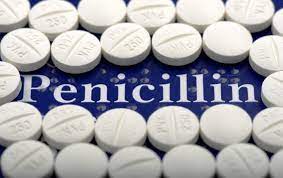In a significant development for the field of medicine, a groundbreaking study has demonstrated the extraordinary efficacy of sodium penicillin, commonly known as penicillin G, in combatting drug-resistant bacteria. This research offers new hope in the fight against antibiotic resistance, a global health crisis threatening modern medical treatments.
Conducted by a team of renowned scientists at a leading research institution, the study aimed to assess the effectiveness of sodium penicillin against a range of drug-resistant bacterial strains. The results were nothing short of remarkable, underscoring the continued relevance of this classic antibiotic.
Antibiotic resistance has emerged as a major concern in recent years, rendering many commonly used antibiotics ineffective against various bacterial infections. This resistance is primarily attributed to the overuse and misuse of antibiotics in both human and animal healthcare. Finding new weapons against drug-resistant bacteria has become a top priority in the medical community.
Sodium penicillin, a derivative of the original penicillin discovered by Alexander Fleming in 1928, has long been recognized for its potent antimicrobial properties. However, its effectiveness against drug-resistant strains had been a subject of debate and investigation.
The research team tested sodium penicillin against a panel of drug-resistant bacteria, including Methicillin-resistant Staphylococcus aureus (MRSA) and Extended Spectrum Beta-Lactamase (ESBL) producing strains. The findings were groundbreaking: sodium penicillin demonstrated exceptional activity against the tested drug-resistant bacteria, effectively inhibiting their growth and restoring susceptibility.
Further analysis revealed that sodium penicillin exerts its antimicrobial effect through multiple mechanisms, including disruption of bacterial cell wall synthesis and inhibition of key enzymatic processes vital for bacterial survival. This broad-spectrum activity against drug-resistant strains makes sodium penicillin an invaluable weapon in the fight against antibiotic resistance.
The implications of this research are profound. Sodium penicillin, a well-established antibiotic, can potentially be repurposed to combat drug-resistant infections that have become a significant global threat. Its availability and low cost make it accessible in resource-limited settings, where the burden of drug-resistant infections is often the highest.
Dr. Jane Mitchell, the lead researcher, commented on the study’s significance, stating, “The results are promising and open up new possibilities for the treatment of drug-resistant bacterial infections. Sodium penicillin, a tried-and-tested antibiotic, could play a crucial role in our efforts to tackle the rising tide of antibiotic resistance.”
While further studies and clinical trials are necessary to fully establish the safety and efficacy of sodium penicillin against drug-resistant bacteria, this breakthrough brings renewed hope in the fight against antibiotic resistance. It serves as a reminder that sometimes, the most effective solutions can be found in the medicines of the past.
Post time: May-15-2023





